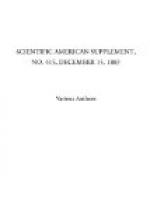In a discussion at one of the meetings (1876) of the London Medico-Psychological Society, the general opinion of the members was, that intemperance is the most fruitful source of the increase of insanity, even when no other etiological element could be found, and alcohol had to be looked upon as the sole cause of the mental disease. Maudsley laid especial stress upon the observation, that intemperance, without hereditary predisposition, was one of the most powerful agencies in the production of aberration of the mind. Even Beckwith, who could not coincide with others as to the great importance of intemperance as an etiological element, says distinctly, that intemperance was, by far, the most potent of all removable causes of mental disease.
In comparing the number of drinking saloons in the different provinces of the kingdom of Prussia with the number of insane, both in public institutions and in private families, as gleaned from the census report of 1871, I was enabled to show conclusively, that everywhere, where the number of drinking places, i.e., the consumption of alcohol, was greatest, the number of insane was also largest. Without doubt, to my mind it is in alcohol that we must look for and will find the most potent cause of the development and spread of mental diseases.
As is well known, alcohol acts as a disturbing element upon the nerve centers, even if it has only once been imbibed in excessive quantity. In consequence of the acute disturbance of circulation and nutrition an acute intoxication takes place, which may range from a slight excitation to a complete loss of consciousness. After habitual abuse of alcohol, the functional disturbances of the brain and spinal cord became constant and disappear the less, as in the central organs degenerative processes are more and more developed, processes which lead to congestions and hemorrhagic effusions in the meninges and in the brain itself, to softening or hardening, and finally to disappearance of the brain substance. These degenerations of the nervous system give rise to a progressive decay of all intellectual and also, more especially, of the ethical functions, a decay which presents the phenomena of feeble mindedness, complicated with a large number of sensational and motor disturbances, and gradually ends in complete idiocy.
The number of those mental disturbances which are caused by alcohol intoxication is a very considerable one. We do not err if we assert that from 20 to 25 per cent. of all mental diseases stand in a direct or indirect relation to the evil consequences of intemperance in the use of intoxicating liquors. This is the opinion of a large number of authorities on mental diseases in all countries. Habitual intemperance leads to severe (psychical?) lesions (of the nervous system) which may show themselves in the different forms of insanity, but express themselves chiefly as mental weakness, not only in persons whose nervous system was weakened through inherited or acquired defects, but also in those whose mental organization was intact. In many other cases we see less complete forms of insanity and more indistinct psychological disturbances and neuroses, and among the latter epilepsy demands particular attention.




